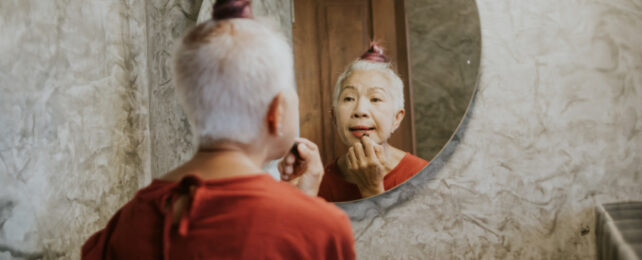Aging is inevitable, but on a cellular level, it's also malleable – known to accelerate during pregnancy and times of stress, yet reversibly so.
However, the way our bodies feel or function is different to how people view us; how old they think we look.
Judgmental? Possibly. But also, kind of accurate: Research shows that estimating someone's age just by looking at them can predict their overall health fairly well, as can shaking their hand.
But expressing those views might also have serious psychological impacts for people on the receiving end of ageist comments, both positive or negative, with ramifications for their physical health. Our own perceptions of aging could also influence how we grow old too.
That's according to a new study from University of Oklahoma health scientist Julie Ober Allen and colleagues, who used data on 2,006 US adults aged 50 to 80 years old from a 2019 national survey on healthy aging.
The participants were polled on how young or old they thought they looked relative to their peers, and whether they experienced any age-related discrimination or positivity in the form of compliments or being asked for pearls of wisdom or advice.
While 59 percent of people thought they looked younger than their peers, only 6 percent admitted they looked older than people of the same age.
So, most of us tend to think we look more sprightly than we really are, regardless of our ethnicity. Whether or not other people agreed wasn't part of the study; it had no external measures of aging.
Compared to men, more women thought they looked younger than their peers but they also tended to spend more time and money than men trying to look younger, if they could afford it.
But investing precious time and hard-earned money on looking youthful, as one-third of participants did, didn't always repel negative comments or stereotypes of aging for either sex. These people reported experiencing ageism, such as negative assumptions about their ability to see, hear, or use technology, as well as receiving positive affirmations about their age – and all that effort may have come at a personal cost.
"Perhaps those who tried and succeeded in looking younger experienced less discrimination," says Allen. "However, those same individuals may have also felt more anxious and uncomfortable with their aging appearance."
Somewhat expected, the study did find that people who reported receiving more positive age-related comments were also more likely to report being in better physical and mental health.
On the flip side, those who weathered discrimination or negative remarks tended to say they had poorer health, both mentally and physically. That's concerning because society's pervasive bias against older adults – which shamefully, is still socially acceptable in many ways – could feed a vicious cycle that sees older people slide into poorer health that makes them age faster.
"Feelings and experiences of ageism, which are rooted in our society's emphasis on youthfulness and bias against aging, appear to indirectly have a relationship with health, both mental and physical," says Allen.
It's worth noting that the study only looked at US adults, and while participants did represent various ethnic groups, other cultures or countries may have different perceptions or values of aging.
Psychologists encourage people to reframe their own attitudes toward aging because research shows that older adults with positive self-perceptions of aging live longer.
Rather than getting hung up on age, people would also do better focusing on what they can do to improve their health such as moving more, eating better, and smoking and drinking less.
"We should be emphasizing healthy behaviors, many of which have implications for aging and appearance," Allen says. "If you exercise, maintain a healthy weight and don't smoke, you will look younger as you age."
The study has been published in Psychology and Aging.
